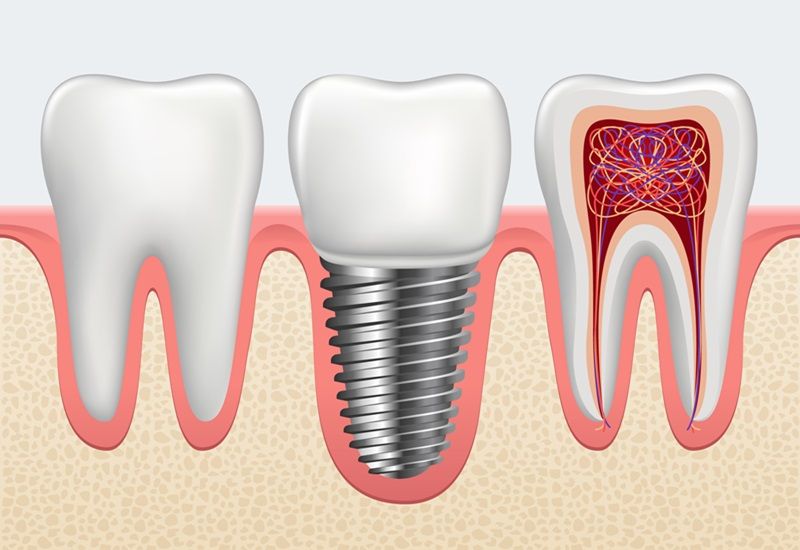A Guide to Dental Implants and Its Different Types

by Dr. Aja
20 May 2024

Dental implants have revolutionized the field of dentistry, providing a highly effective and long-lasting solution for individuals with missing teeth. With advancements in technology, there are now various dental implant types available to suit different needs and preferences.
Dental implants fuse with the jawbone, unlike conventional bridges or dentures that sit on the gum line and depend on adjacent teeth for support. A cosmetic dentist performs a process called osseointegration for this. You can consult for options with the best dentist in San Francisco to make the right choice.

What are Dental Implants?
Dental implants are titanium posts. A cosmetic dentist usually inserts these posts surgically into your jawbone. These posts then serve as artificial tooth roots. They provide a stable base for prosthetic teeth like bridges, crowns, or even dentures.
When You Need to Get Dental Implants?
Here is when you must consult a cosmetic dentist about getting dental implants.
- Single Tooth Replacement: If you have lost a single tooth due to decay, injury, or extraction, a dental implant can be an ideal solution. The implant will integrate seamlessly with your jawbone, providing a sturdy base for a customized crown that matches your natural teeth.
- Multiple Teeth Replacement: When several adjacent teeth are missing, dental implants can support a bridge that spans the gap. Unlike traditional bridges that require support from healthy teeth, dental implants do not compromise the integrity of neighboring teeth.
- Full Arch Replacement: Individuals with complete tooth loss often struggle with dentures, as they can slip, cause discomfort, and affect speech and chewing. Dental implants offer a secure and stable foundation for full arch replacement such as implant-supported dentures. This option enhances comfort, confidence, and overall oral function.
Dental implants offer several advantages, such as:
- Dental implants offer a robust foundation for teeth replacement. They allow for better chewing ability.
- Dental implants tend to last longer and look more natural. They also cause less decay in their surrounding teeth and do not require damaging surrounding teeth.
- Dental implants are designed to look and function like your natural teeth. They give patients the confidence to eat, speak, and engage in social activities without worrying about their appearance.
- Dental implants come in a wide variety of shapes and sizes. These allow for customization to match the color of surrounding teeth and fit perfectly in the gap.
 What are Different Types of Dental Implants
What are Different Types of Dental Implants
Here is an overview of the different types of dental implants you need to know.
Endosteal Implants
Endosteal implants are one of the most widely used dental implant types today. They involve placing titanium screws surgically into the jawbone directly. Once the dental implant fits properly with the bone, then the dentist will attach a prosthetic tooth to the implant.
This type of implant is ideal for individuals with healthy jawbones and sufficient bone density. They offer excellent stability and can support single teeth or multiple teeth through bridges or dentures.
Subperiosteal Implants
Subperiosteal implants serve as an alternative for individuals who contain inadequate bone density or do not want to get bone grafting process. This type of implant is positioned on your bone’s top, beneath your gum tissue, rather than being placed within the jawbone.
A metal framework is placed over the jawbone, and prosthetic teeth are attached to it. Subperiosteal implants are a suitable option for individuals with shallow jawbones or those who prefer a less invasive procedure.
All-on-4 Dental Implants
All-on-4 dental implants offer a comprehensive solution for individuals who have lost all or most of their teeth. This innovative technique involves strategically placing four implants in the jawbone. It supports a complete arch of prosthetic teeth and offers exceptional stability and function.
They also allow individuals to regain their ability to speak, eat, and smile confidently. This technique also eliminates the need for bone grafting in most cases, making it a popular choice for many patients.
Implant Overdentures
They provide the benefits of both dental implants and removable dentures convenience. With this type of implant, two or more implants are placed in the jawbone, and a denture is securely attached to the implants.
Implant overdentures provide more stability than traditional dentures, preventing slippage and discomfort. The denture can be easily removed for cleaning and maintenance, making it a convenient option for many patients.
Implant-supported Bridges
Implant-supported bridges are an excellent solution for individuals who are missing multiple teeth in a row. Instead of relying on neighboring teeth for support, these implant-supported bridges are attached to dental implants placed in the jawbone. This type of implant provides stability and functionality similar to natural teeth, restoring a patient's ability to chew and speak with ease.

A genuine smile comes from the heart, but a healthy smile needs good dental care.
Why Choose Dental Implants?
Here are some important reasons why you need to choose dental implants:
Improved Oral Health
Dental implants preserve jawbone integrity by preventing bone loss and stimulating bone growth. These problems can occur when a tooth is missing. Unlike traditional bridges, implants do not require altering healthy adjacent teeth. Implants contribute to overall well-being by maintaining oral health.
Enhanced Aesthetics
Dental implants are designed to blend seamlessly with your natural teeth, providing a realistic appearance. Customized crowns, bridges, or dentures not only restore your smile but also help to support facial structure, preventing a sunken appearance that can occur with tooth loss.
Longevity and Durability
Dental implants are built to last. They can serve you for a lifetime with proper care and good oral hygiene. This longevity makes them a cost-effective solution in the long run compared to alternative options that may require frequent repairs or replacements.
Whenever you feel the need to undergo dental implants, you must contact a specialized cosmetic dentist. Choosing the best dentist in San Francisco can help you make a better decision based on your oral health needs.
Tips for Taking Care of Dental Implants
Dental implants require proper care to ensure their longevity and maintain optimal oral health. Here are some essential tips for taking care of dental implants:
- Dental implants require regular brushing and flossing to prevent plaque buildup and maintain oral hygiene.
- Avoid using hard-bristled toothbrushes, as they can damage the enamel on your teeth and are particularly bad for dental implants.
- It is recommended to avoid eating any hard foods immediately following implant surgery. This practice could damage the implant during the healing period.
- Schedule regular visits to your dentist for routine cleanings and check-ups. Dental implants benefit from routine cleanings in the same way natural teeth do.
Final Thoughts
Dental implants have revolutionized the way we address tooth loss, offering a durable and aesthetically pleasing solution. By understanding the different types of dental implants available, patients can make informed decisions about their dental health. Consulting with the best dentist in San Francisco is crucial to determining the most suitable implant option based on individual circumstances.
Overall, advancements in dental implant technology allow individuals to restore their smiles and regain their confidence with ease and comfort.
Contact your Dentist today, Dr. Aja at One Dental SF, to learn more about Dental Implant.
Disclaimer
*This media/content or any other on this website does not prescribe, recommend, or prevent any treatment or procedure. Therefore, we highly recommend that you get the advice of a qualified dentist or other medical practitioners regarding your specific dental condition. *